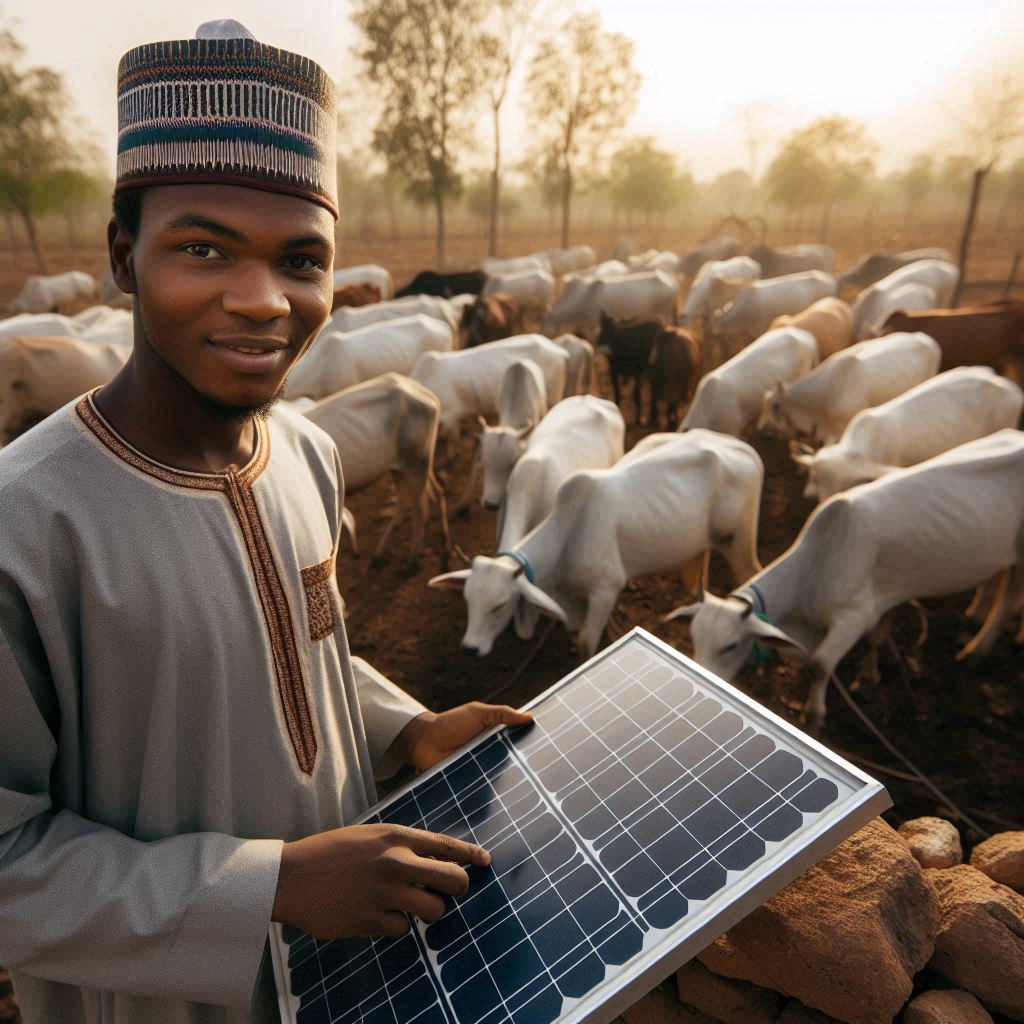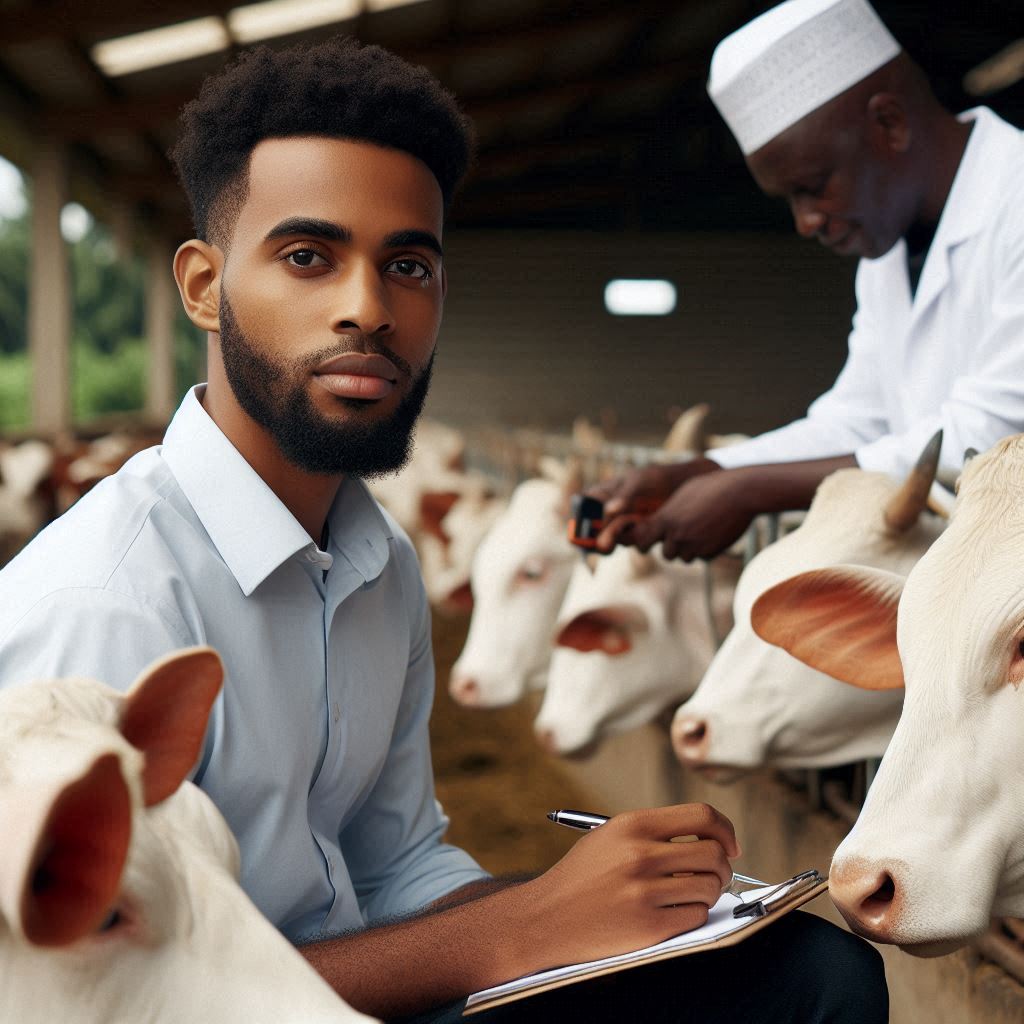Introduction
Livestock production plays a crucial role in Nigeria’s economy and food security.
It provides essential protein sources, employment, and income for millions of Nigerians.
However, livestock producers in Nigeria face significant challenges that hinder their productivity and growth.
Diseases like foot-and-mouth and avian influenza threaten livestock health and reduce productivity.
Poor infrastructure hampers efficient transportation, limiting access to markets and increasing costs.
Inadequate veterinary services and lack of access to quality feed and water adversely affect livestock well-being and productivity.
Climate change impacts grazing lands, causing food shortages and escalating conflicts over dwindling resources.
Financial constraints limit the ability to invest in better farming practices and advanced technologies.
Additionally, a lack of education and training among farmers exacerbates these issues, preventing the adoption of modern techniques.
These challenges collectively hinder the growth and sustainability of livestock production in Nigeria.
Addressing these issues is vital for enhancing food security and economic stability.
In the following sections, we will explore potential solutions to overcome these obstacles and boost livestock production in Nigeria.
Challenges in Livestock Production
Health Challenges in Livestock Production
- Outbreaks of diseases threaten the health of livestock, resulting in decreased productivity and economic losses.
- Inadequate access to veterinary services hinders timely diagnosis and treatment of diseases in livestock.
Feed and Water Challenges
- Lack of quality feed affects the growth and development of livestock, leading to reduced productivity.
- Inadequate access to clean water can result in dehydration and health issues among livestock.
High Cost of Production
- The high cost of inputs such as feed, medication, and labor makes livestock production financially challenging.
- Insufficient funding for modern practices limits the adoption of advanced technologies for improved productivity.
Infrastructure Challenges
- Transportation issues hinder the movement of livestock to markets, affecting timely sales and profits.
- Inadequate storage facilities for livestock products can lead to wastage and loss of income for producers.
Read: Career Prospects in Forestry: Opportunities in Nigeria & Beyond
Environmental Factors Affecting Livestock Production
Climate change effects on grazing lands and water sources
Climate change is a significant environmental factor that affects livestock production. As temperatures rise, grazing lands may become less productive, leading to a decrease in available forage for livestock.
Additionally, changes in precipitation patterns can impact the availability of water sources for animals, further exacerbating the challenges faced by livestock producers.
Deforestation and land degradation impacting availability of pasture
Deforestation and land degradation also pose serious threats to livestock production. As forests are cleared for agricultural purposes or urban development, the availability of pastureland diminishes.
This can lead to overgrazing in existing areas, resulting in soil erosion and a decline in overall pasture quality.
Pollution from livestock waste affecting water sources and soil quality
Moreover, pollution from livestock waste can have detrimental effects on water sources and soil quality. Runoff from manure and other waste products can contaminate water sources, making it unsafe for both animals and humans.
Additionally, improper disposal of waste can lead to soil degradation and nutrient imbalances, further impacting the productivity of grazing lands.
Strategies to Mitigate Environmental Challenges
Implementing sustainable grazing practices
To address the challenges posed by climate change, livestock producers can adopt sustainable grazing practices such as rotational grazing or silvopastoral systems.
These methods help to maintain the health of grazing lands and ensure a continuous supply of forage for animals. Additionally, utilizing drought-resistant forage species can help mitigate the impact of changing weather patterns on pasture productivity.
Promoting reforestation and land conservation efforts
Reforestation and land conservation efforts are essential for combating deforestation and land degradation.
By planting trees on degraded lands and implementing conservation practices, livestock producers can restore pastureland and prevent further soil erosion. Protecting existing forests can also help maintain biodiversity and provide additional benefits for livestock production.
Improving waste management and recycling practices
Improving waste management and recycling practices is crucial for reducing pollution from livestock operations.
Implementing anaerobic digesters to capture methane from manure, or utilizing composting techniques to recycle waste products, can help minimize the environmental impact of livestock production.
Additionally, constructing lagoons or buffer zones to capture runoff can prevent contamination of water sources and protect soil quality.
Most importantly, addressing environmental factors affecting livestock production requires a combination of sustainable practices and conservation efforts.
By implementing strategies to mitigate the impact of climate change, deforestation, and pollution, livestock producers can enhance the resilience and productivity of their operations while safeguarding the environment for future generations.
Read: Comparing Forestry Curriculum: Nigeria vs. Global Standards
Socio-economic Challenges
Limited technical skills and knowledge among livestock farmers can hinder production efficiency.
One of the significant challenges facing livestock production today is the limited technical skills and knowledge among farmers. This lack of expertise can hinder production efficiency, leading to lower yields and reduced profitability.
Many farmers in the livestock industry have not received adequate training or education on modern farming techniques, animal health management, and sustainable practices.
As a result, they may struggle to maximize their production potential and adapt to changing market demands.
Market access and price fluctuations can significantly affect the profitability of livestock production.
Furthermore, market access and price fluctuations present ongoing challenges for livestock farmers. Fluctuating prices can make it difficult for farmers to predict their earnings and plan for the future effectively.
Additionally, limited access to markets can restrict farmers’ ability to sell their products and reach a wider consumer base.
Without stable market conditions and fair prices, farmers may struggle to sustain their operations and invest in necessary resources for growth. This can create a cycle of financial instability and limit the overall growth potential of the livestock industry.
Insecurity and theft of livestock have a direct impact on production levels and the overall success of farms.
Insecurity and theft of livestock are also major concerns for farmers, especially in rural areas. Livestock theft not only impacts the financial well-being of farmers but also disrupts production cycles and can lead to significant losses in inventory.
To address these challenges, farmers and relevant stakeholders must work together to provide continuous education and training opportunities for livestock farmers.
This can help improve overall production efficiency and ensure that farmers are equipped with the necessary skills to succeed in the industry.
Furthermore, efforts must be made to strengthen market access for farmers and develop strategies to mitigate the impact of price fluctuations.
This could involve creating more transparent pricing systems, establishing fair trade agreements, and providing farmers with the resources they need to navigate changing market conditions.
In terms of security, collaborative efforts between farmers, law enforcement agencies, and local communities are essential to address livestock theft effectively.
This may involve implementing security measures on farms, establishing community watch programs, and utilizing technology to track and monitor livestock movements.
By addressing these socio-economic challenges and implementing effective solutions, the livestock industry can overcome obstacles to growth and achieve sustainable development.
With the right support and resources in place, farmers can maximize their production potential, improve profitability, and contribute to the overall success of the industry.
Read: Nigeria’s Forest Reserves: A Vital Part of Forestry Education
Policy and Regulatory Issues
Inconsistent government policies affecting livestock production
Livestock production is heavily influenced by government policies and regulations. Unfortunately, the inconsistency in these policies has posed significant challenges for this industry.
For instance, there are times when the government introduces policies that favor large-scale livestock producers over smaller ones. This creates an uneven playing field and puts smaller producers at a disadvantage.
Lack of enforcement of regulations on animal health and welfare
Moreover, the lack of enforcement of regulations on animal health and welfare is a major concern. Without proper enforcement mechanisms in place, many livestock producers may ignore important guidelines that protect the well-being of animals.
Limited support and incentives for small-scale livestock producers
Small-scale livestock producers face an additional challenge due to the limited support and incentives available to them. As they often lack the resources and infrastructure of larger producers, they struggle to compete in the market.
To address these issues, policymakers need to create clear and consistent policies that support all types of livestock producers. This includes providing incentives for small-scale producers to encourage growth and sustainability within the industry.
Additionally, there should be stringent enforcement mechanisms in place to ensure that all livestock producers adhere to regulations on animal health and welfare. This will not only protect the animals but also the reputation of the industry as a whole.
Support programs tailored specifically for small-scale producers are crucial for their success. By providing them with access to resources, training, and financial assistance, they can thrive and contribute significantly to the overall livestock production sector.
Therefore, overcoming policy and regulatory challenges in livestock production requires a concerted effort from governments, industry stakeholders, and producers themselves.
By addressing these issues head-on, we can create a more sustainable and responsible livestock production system for the future.
Read: Field Work & Practical Training in Nigerian Forestry Schools

Solutions to Address Challenges
Improving Veterinary Services and Disease Control Measures
Strengthening veterinary services is crucial for healthy livestock. We need well-trained veterinarians available in all rural areas. They must provide regular check-ups and timely vaccinations. Early disease detection helps prevent outbreaks and reduces livestock mortality.
Key steps to improve veterinary services:
- Increase the number of veterinary clinics in rural areas.
- Provide mobile veterinary units for remote locations.
- Ensure continuous training for veterinarians on emerging diseases.
- Facilitate access to affordable veterinary medicines and vaccines.
Promoting Sustainable Livestock Management Practices
Sustainable livestock management is essential for long-term productivity. Implementing eco-friendly practices benefits both the environment and the livestock. Farmers should adopt rotational grazing to maintain soil health and reduce overgrazing.
Strategies for sustainable livestock management:
- Implement rotational grazing systems.
- Use organic feed to promote animal health.
- Manage waste properly to prevent environmental pollution.
- Encourage mixed farming to diversify income and improve soil quality.
Enhancing Access to Finance and Training for Livestock Farmers
Financial support is critical for livestock farmers to thrive. Farmers often lack the funds to invest in necessary resources and technology. Improving access to credit can help farmers expand and improve their operations.
Measures to enhance financial support
- Provide low-interest loans tailored for livestock farmers.
- Establish grant programs for farm improvements.
- Facilitate microfinance options for small-scale farmers.
- Offer financial literacy training to help farmers manage funds efficiently.
Training is equally important. Farmers need continuous education on best practices and new technologies. Training programs should be accessible and relevant to local farming conditions.
Training initiatives to support farmers
- Conduct regular workshops on modern farming techniques.
- Develop online resources and e-learning platforms.
- Collaborate with agricultural universities for knowledge transfer.
- Promote farmer-to-farmer learning through community groups.
Investing in Research and Technology for Improved Production
Investment in research and technology drives innovation in livestock production. Research helps develop disease-resistant breeds and improves feed efficiency. Technology can streamline farm operations and increase productivity.
Research and technology investments:
- Fund research on disease-resistant livestock breeds.
- Develop advanced feed formulas to enhance nutrition.
- Use precision farming tools to monitor animal health.
- Implement automation for tasks like feeding and milking.
Technological advancements to adopt
- Utilize wearable devices to track livestock health.
- Implement GPS systems for better grazing management.
- Use data analytics to predict and manage disease outbreaks.
- Invest in solar-powered equipment to reduce energy costs.
By addressing these key areas, we can overcome the challenges in livestock production. Strengthened veterinary services, sustainable practices, financial support, and technological investments will ensure a robust livestock sector.
Farmers will benefit from higher productivity, healthier livestock, and sustainable livelihoods.
Conclusion
In closing, livestock production in Nigeria faces numerous challenges, including disease outbreaks, inadequate feed, and poor infrastructure.
Farmers often struggle with limited access to veterinary services and modern farming technologies.
Environmental issues, such as climate change, further impact livestock health and productivity.
Additionally, high costs of feed and medications burden farmers financially.
Addressing these challenges is crucial for sustainable growth in the livestock sector.
Implementing effective disease control measures can significantly reduce livestock mortality rates and improve overall herd health.
Improving feed quality and availability will boost animal health and productivity, ensuring better yields.
Investing in infrastructure and technology will enhance efficiency and output in livestock farming, making operations more resilient.
Supporting farmers through education and resources will empower them to adopt best practices and innovative solutions.
By tackling these issues head-on, Nigeria can achieve a thriving livestock industry that ensures food security and economic growth.
Prioritizing solutions to these challenges is essential for the long-term success and sustainability of the livestock sector.
With concerted efforts and strategic investments, the future of livestock production in Nigeria can be both prosperous and sustainable.




